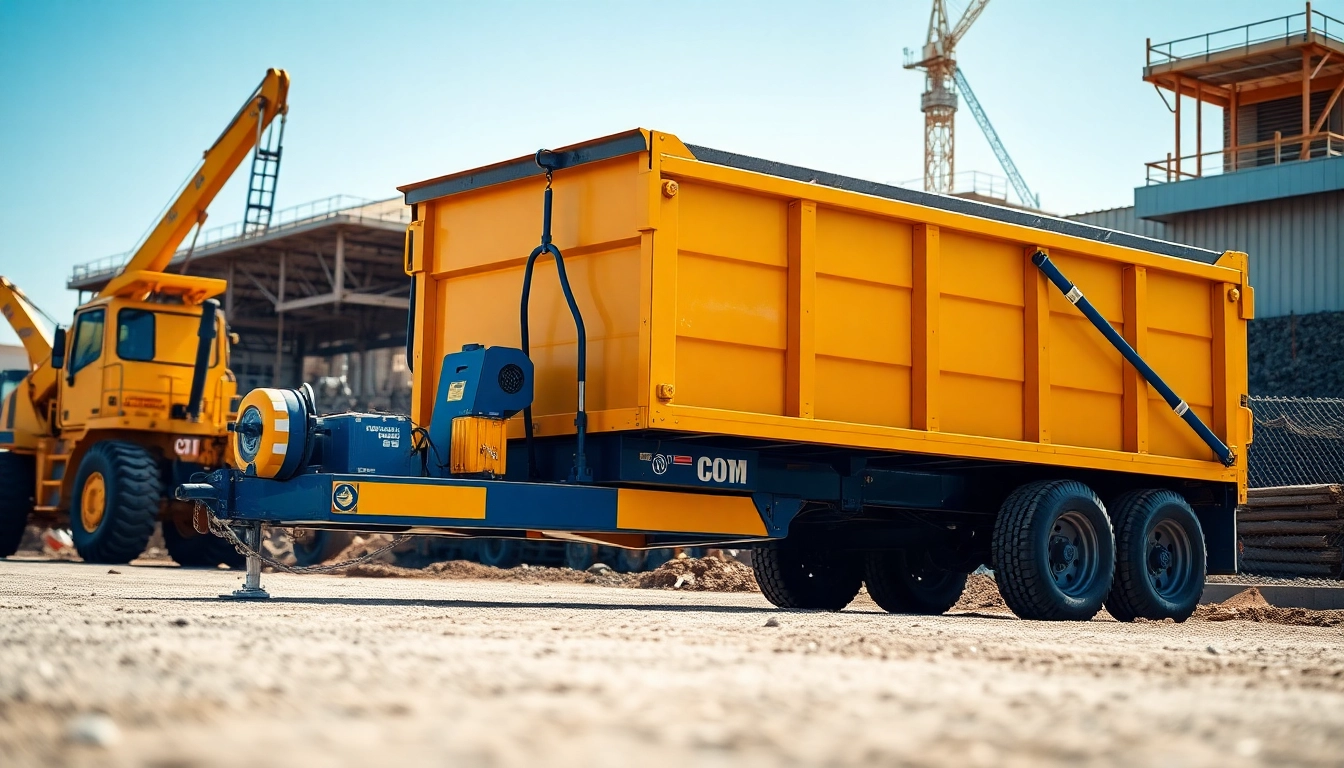
Understanding Dump Trailers
What is a Dump Trailer?
A dump trailer is a specialized type of trailer designed for transporting loose materials such as gravel, sand, dirt, and debris. Unlike traditional flatbed or enclosed trailers, dump trailers have a hydraulic lift that allows the bed to tilt, enabling the contents to be unloaded quickly and efficiently. This capability makes them ideal for construction sites, landscaping projects, and any application where bulk materials need to be moved and disposed of.
Key Features of Dump Trailers
- Hydraulic Dumping System: Most dump trailers are equipped with a hydraulic system that provides effortless unloading of materials with the push of a button or the turn of a crank.
- Variety of Sizes and Capacities: Dump trailers come in various sizes, typically ranging from 5 to 20 feet in length, and can carry weight capacities from 2,000 to over 14,000 pounds.
- Reinforced Construction: To withstand heavy loads, dump trailers are often constructed from durable steel or aluminum, including reinforced frames and robust axles.
- Backup Features: Many dump trailers feature built-in brakes, safety chains, and reflective markings for added safety.
Common Uses for Dump Trailers
Dump trailers are multifaceted tools used across various industries, including:
- Construction: Transporting building materials such as gravel, asphalt, and lumber to job sites.
- Landscaping: Delivering soil, mulch, and rocks for landscaping projects.
- Debris Removal: Clearing out construction debris, yard waste, or demolition materials.
- Farm Use: Transporting feed, hay, or other agricultural products.
Finding Dump Trailers for Sale Near Me
Local Dealerships and Online Options
When searching for a dump trailer for sale near me, both local dealerships and online platforms provide numerous options. Local dealerships often offer the advantage of being able to view the trailer in person, allowing potential buyers to assess its condition and features firsthand. Additionally, many dealerships provide warranties and after-sales service.
Online marketplaces, such as Craigslist and Facebook Marketplace, are also excellent resources. Here, you can compare prices from various sellers, view more options from private owners, and sometimes find deals that are not available at dealerships. However, purchasing from an individual seller might require more diligence to ensure the trailer is in good condition and fairly priced.
Evaluating Sellers and Their Reputation
Before making a purchase, it’s crucial to verify the reputation of sellers, particularly on online platforms. Assess reviews, feedback, and ratings of the seller. If purchasing from a dealership, check if they have good standing with the Better Business Bureau (BBB) or similar organizations. For individual sellers, consider asking for references or contact previous customers if possible. It is also wise to have potential purchases inspected by a professional before finalizing any transaction.
Seasonal Sales and Promotions
Many dealerships and retailers offer seasonal sales, particularly during holidays or at the end of financial quarters. These deals can provide significant savings or financing options. Keep an eye out for promotions during these peak times, as retailers often price trailers competitively to boost sales. Subscription to newsletters or following dealerships on social media can also be advantageous for staying informed about discounts and special events.
Factors to Consider When Purchasing a Dump Trailer
Size and Weight Capacity Requirements
Determining the intended use of the dump trailer is essential for selecting the appropriate size and weight capacity. For light landscaping projects, a smaller trailer may suffice, but for substantial construction tasks, a larger trailer with more weight capacity is necessary. It’s essential to evaluate what materials you will be transporting and ensure the trailer can handle the weight and volume.
Material Quality and Durability
The materials used in the construction of a dump trailer greatly influence its durability and longevity. Most high-quality dump trailers feature construction from either heavy-duty steel or tough aluminum. When examining options, look for trailers with at least a single or double axles for better weight distribution and stability while in transit. Additionally, inspect for quality welding and finish, as these elements directly correlate with overall durability.
Price Comparisons and Financing Options
Purchasing a dump trailer is a significant investment, so comparing prices across different dealerships and online platforms is crucial. Don’t just go for the seemingly best deal; evaluate what features and benefits come with each price point. Many dealerships also provide financing options that can make high-ticket items more affordable. Understanding the terms and exploring different financing plans can help budget your purchase better and avoid high-interest payments.
Maintaining Your Dump Trailer
Regular Maintenance Practices
Maintenance is key to ensuring your dump trailer remains in optimal condition throughout its lifespan. Regular checks and upkeep can include:
- Inspecting the hydraulic system for leaks or damages.
- Lubricating the hinge points and moving parts to prevent wear.
- Checking the electrical system, especially lights and brakes.
- Regularly cleaning the bed of the trailer to avoid rust formation.
Repairs and Troubleshooting Tips
In case of repairs, having the right knowledge can save both time and money. Common issues include hydraulic leaks or malfunctioning lifts. If you experience difficulties, consult the trailer’s manual or work with a professional mechanic. Keeping replacement parts on hand, such as hydraulic pumps or wiring, can minimize downtime when repairs are necessary.
Extending the Life of Your Trailer
To extend the life of your dump trailer, ensure that you do not exceed the weight capacities specified by the manufacturer. Additionally, store the trailer in a dry, sheltered location when not in use to avoid weather-related damage. Regular inspections and repairs will help maintain performance and ensure it serves you well for years.
Using Your Dump Trailer Effectively
Loading Techniques and Safety
Proper loading techniques are crucial not only for safety but also for maximizing efficiency. When loading materials, ensure that the weight is evenly distributed to maintain balance while transporting. Always load heavier items first and secure them to prevent shifting during transit. Safety protocols should be adhered to, including wearing protective gear when operating machinery or interacting with heavy materials.
Best Practices for Transportation
When transporting using a dump trailer, ensure you’re following local guidelines related to road usage and weight limits. Make sure all straps and nets are secure to avoid losing materials during transit. It’s also important to keep a safe distance from other vehicles, especially when turning or stopping, as a loaded trailer can affect your stopping distance.
Innovative Uses Beyond Traditional Applications
Dump trailers are not only limited to conventional uses; they can be transformative tools in various applications. For instance, they can be repurposed for mobile workshops, portable animal feeders in farms, or even as storage units during events or construction work. Innovations in trailer use highlight the versatility and potential for efficiency gains across industries.






